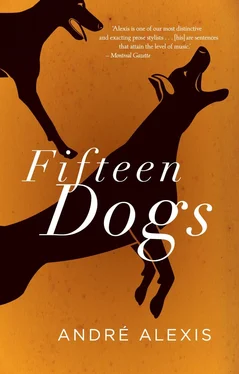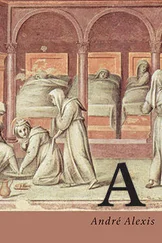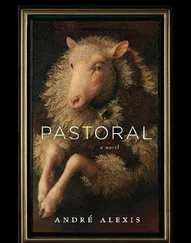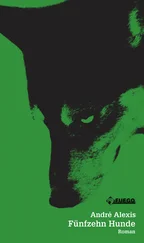Next time, thought Majnoun, I’ll touch her shoulder if she leans down.
What followed was so unpleasant, however, that there was to be no ‘next time’ for a very long time indeed. The consequences of his having spoken were clear: the woman was now frightened of him. She would not enter any room he happened to be in. Then the man took Majnoun to a place where he was left overnight. The following day, Majnoun was prodded, poked, given needles, fed food that did not taste proper and kept for observation in a cage beside other dogs who grew aggressive at the smell of him. This was humanity, this unpredictability, this cruel behaviour and bullying. The worst of it was, in his weakened state, he could not open the door to his cage. He had no choice but to attend his fate.
The whole business provided a good, if unexpected, lesson. He would almost certainly have tried to communicate with cats or squirrels, mice or birds, if he could make out their language. He might have tried to communicate with any species. From that moment on, however, he resolved to hide his knowledge of human language from humans themselves. It was evident that, for whatever reason, humans could not stand to be spoken to by dogs.
On the third day, the woman returned for him herself.
Just as Majnoun was settling into sleep, the other dogs having grown tired of threatening him, the door to the room opened and the woman was led in by one of the men who’d held him down so that a man in white could take some of his blood. The man opened the door to his cage and, not without trepidation, Majnoun followed the woman out.
Once on the street, it occurred to Majnoun that he ought to run for it. The evening was inviting. It was late spring. The sun had not quite set. A reddish strand lay over the buildings in the distance. But, of course, Majnoun was still hampered by his injuries, by the pain he experienced when running. He could not have run for long and he would only have exhausted himself or, worse, got himself lost in territory he did not know. So he climbed into the back seat of the car.
Rather than go to the driver’s seat, the woman climbed in the back with him.
— I’m sorry I sent you to that place, she said, but you frightened me. Do you understand?
Resigned to whatever would come, but firm in his resolve not to speak human words, Majnoun nodded.
— What are you? she asked. Are you a dog?
A surprisingly difficult question to answer. He did not feel very much like a dog. He felt adrift between species. But he knew what she meant by the word, so again he nodded.
— You have to understand, she said, that dogs never speak to people. It’s never happened, as far as I know. I thought you were possessed. That’s why I was frightened. What’s your name?
This Majnoun would not say, not only because ‘Majnoun,’ the name his master had given him, was difficult for him to pronounce, not only because he would not speak, but also because it seemed to him that he no longer had a true name. He stared at the woman, then shook his head.
— My name is Nira, she said. Do you mind if I call you Jim?
An impossible question. Majnoun was unsure what Nira wanted to know. Did he accept the name ‘Jim’? Yes, why not? Did he feel displeasure at the thought that she would use the name ‘Jim’ when referring to him? No, he did not. He stared at her and then, guessing at the appropriate signal, nodded his head.
— You’re never going to speak to me again, are you? Nira asked.
Another difficult question. He did not intend to use human words, but as far as he was concerned he was speaking to her. This time, he did not answer. He turned to look out the window at the lamplit park on the other side of the street.
— Never mind, said Nira. It’s my fault. You don’t have to speak if you don’t want to.
In all the time they spent together before Majnoun spoke again, Nira never asked him to speak. In fact, she grew to admire his wordlessness. Majnoun rarely barked. He could see no point in using a language he knew Nira did not understand. He communicated all of his needs and most of his thoughts with a nod or a shake of the head. And as they grew closer, Nira needed even less from him. She learned to read his expression, the disposition of his body, the tilt of his head.
At that moment, however, the two sitting in the back of the Honda Civic, it was not obvious that they would develop anything like ‘understanding’ or ‘friendship.’ Nira was still frightened of Majnoun. Yes, he was obviously hobbled, unable to walk for long without stopping and lying down, and his limitations called forth her pity. It’s why they’d taken him in, after finding him clinging to life in High Park. But the thought that an intelligent being was in their home, that she had let this creature into her bedroom, into the very heart of her private life … the thought was as humiliating as it was frightening. It took her a long time to overcome these feelings. Majnoun never again slept in her bedroom, for instance, and she ever after felt embarrassed whenever she came upon him licking his genitals.
What helped bind the two was the quality of Majnoun’s silence. It was sophisticated, the kind of silence that invited response. Nira spoke to him, at first, about trivial things: work, home renovations, the minor annoyances of living with her husband, Miguel. Gradually, she began to open up about deeper matters: her thoughts about life and death, her feelings about other humans, her concerns for her own well-being — she had survived a bout of cancer and was, at times, helplessly afraid of its return.
Though Majnoun was neither smarter nor quicker than she was, Nira gave him credit for a wisdom she supposed must come from his unique vantage on the world. But it did not always occur to her that Majnoun’s vantage also limited his ability to imagine or understand her concerns. For instance, when she complained that her husband was terribly untidy, that he had the disgusting habit of cutting his toenails and biting the clippings, Majnoun looked at her, utterly perplexed. It seemed to him that Miguel was right to groom himself this way. Did she wish to bite Miguel’s clippings herself, he wondered.
On another occasion, while he lay in his wicker basket, she asked
— Do you believe in God?
Majnoun had never heard the word before. He’d tilted his head, as if to ask her to repeat the question. And she did her best to explain the concept behind the word. As Majnoun took it, the word seemed to refer to a ‘master of all masters.’ Did he believe in such a being? The thought had never occurred to him, but he supposed such a being was possible. So, when she asked the question again, he nodded to say ‘yes.’ This was not the answer she wanted.
— How can you believe such a ridiculous thing? she asked. I suppose you believe God is a dog?
Majnoun believed no such thing. He believed only that the ‘god’ Nira had described was possible, the same way that he believed a bitch perpetually in heat was possible. A ‘master of all masters’ was an idea, but it was one that did not concern him, so he could not understand Nira’s contempt. They had similar misunderstandings when they spoke of ‘government’ (a group of masters deciding how a pack should behave) and ‘religion’ (a group of masters deciding how a pack should behave toward a master of masters). The more Nira spoke of these things, the more difficult it was for Majnoun to believe that any group of masters — especially human ones — could act in concert, whatever the purpose or end. So that both ‘government’ and ‘religion’ began to seem like very bad ideas.
Perhaps the most frustrating moment — for both of them — came when Nira asked if he had ever loved another dog. As with god , Majnoun had no idea what the word love meant. Nira did her best over several days to give him a sense of the word’s meaning, but Majnoun found her definitions contradictory, frustrating and vague. The word corresponded to no emotion he could recognize, but her ideas were intriguing enough to keep him attentive. For her part, Nira was convinced that any animal as sensitive as Majnoun must have felt love.
Читать дальше












